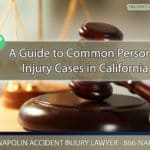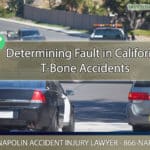Posts Tagged ‘California Law’
The Impact of Seatback Failures in Ontario, California Car Accidents
In the bustling state of California, where the roads are as diverse as its population, the safety of motorists is a subject of paramount importance. Among the myriad of safety concerns, one often overlooked yet critical aspect is the integrity of vehicle seatbacks during rear-end collisions. This article aims to explore the intricate details of…
Read More...Insights into Defective Vehicle Accidents in California
In California, the intricate relationship between vehicle defects and road accidents is a critical aspect of automotive safety and legal responsibility. This article aims to shed light on the nuances of vehicle defects, their impact on road safety, and the legal framework surrounding these issues in California. Understanding these elements is essential for anyone affected…
Read More...A Guide to Common Personal Injury Cases in California
Understanding Your Rights in Car Accident Cases In California, car accidents frequently lead to complex legal disputes. Under California law, victims of car accidents have the right to seek compensation for damages, including medical expenses, lost wages, and pain and suffering. Negligence plays a crucial role in these cases, where proving the other driver’s fault…
Read More...Navigating the Aftermath of a Single-Car Accident in Ontario, California
Single-car accidents, while seemingly straightforward, encompass a range of scenarios from hitting stationary objects to rollovers. In California, these incidents are not just a matter of personal safety but also involve complex legal and insurance considerations. Understanding the nuances of such accidents is crucial, especially in light of California’s traffic laws and insurance regulations. These…
Read More...Determining Fault in Ontario, California T-Bone Accidents
T-bone accidents, also known as side-impact collisions, present unique challenges in the realm of personal injury law, particularly in California. These accidents often result in severe injuries and substantial damages, making the determination of fault a critical aspect for victims seeking legal redress. In California, where traffic laws and liability rules are specific and detailed,…
Read More...What to Do When You Disagree with a QME Report in Ontario, California
In California, a Qualified Medical Examiner (QME) is a pivotal figure in the workers’ compensation system. These are licensed physicians, certified by the California Division of Workers’ Compensation Medical Unit, to evaluate work-related injuries. Their role is to provide an impartial medical opinion on the nature and extent of the injuries, which is crucial in…
Read More...California Auto Accident Insurance Claims with No Police Report
In California, auto accidents can lead to complex insurance claim processes, particularly when a police report is not present. This article delves into the nuances of California law regarding auto accident insurance claims without a police report, offering detailed guidance for individuals facing this challenging situation. The Significance of a Police Report in Auto Accident…
Read More...How Often Personal Injury Claims Go To Trial in California
In California, the landscape of personal injury law is complex and nuanced. While many assume that personal injury cases frequently end up in court, the reality is quite different. This article explores the intricacies of personal injury claims in California, focusing on the prevalence of trials and the factors influencing the path these cases take.…
Read More...A Guide for Car Accident Passengers in Ontario, California
California’s legal system operates under a pure comparative fault rule, which is pivotal for passengers in car accidents. This rule allows for compensation even if the passenger is partially at fault. However, the compensation amount is reduced by the percentage of their fault. For instance, if a passenger is deemed 20% at fault for not…
Read More...Filing for SSD and Survivors Benefits in Ontario, California
Social Security Disability Insurance (SSDI) offers vital financial support to individuals who cannot work due to a disability. In California, eligibility for SSDI hinges on having worked long enough and recently enough, while also having paid Social Security taxes on your earnings. The Supplemental Security Income (SSI) program, on the other hand, aids adults and…
Read More...









